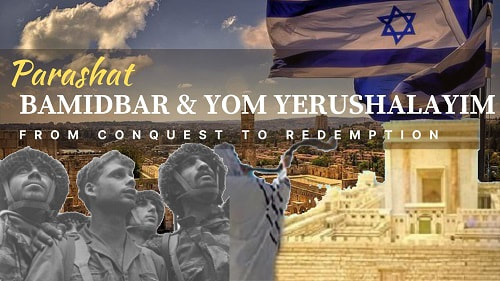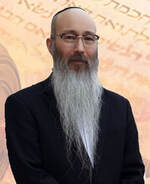|
By: HaRav Menashe Sasson Reporting from Jerusalem, Israel Published in the U.S.A. Sefer Bamidbar [במדבר] begins with Parashat Bamidbar [במדבר]. The Hebrew word “bamidbar [במדבר]” means “in the desert” or “in the wilderness.” Parashat Bamidbar [במדבר] begins with a discussion of the taking of a census of the Jewish people in the desert or wilderness of Sinay, which perhaps is the reason Christians have renamed and given Sefer Bamidbar [במדבר] the name “Numbers.” The Ramban gave three reasons for the census: (1) To document the miraculous growth of the Jewish people, who had descended to Misrayim as a family of 70 individuals; (2) For each Jew to be recognized as an individual; and (3) To prepare for the conscription of Jews into a Jewish military and the subsequent military invasion that would be necessary to conquer the Land upon Jewish entry into Eretz Yisra’el. Why was a military offensive necessary to conquer Eretz Yisra’el when the Jewish people crossed the Yarden river [נהר הירדן]? The answer is simple: Because the inhabitants of the Land would not willingly accept that HaShem, who created the world, can give His Land to the people of His choosing, and the He had decreed that the Jewish people were to be – and are – the rightful owners of Eretz Yisra’el. HaShem, in His infinite wisdom, knew that the occupants of the Land would not voluntarily relinquish their control over Eretz Yisra’el to the Jewish people. Thus, HaShem had the Jewish people prepare for war. But not only did HaShem have the Jewish people prepare for war, He commanded them to expel the inhabitants of the land and to not enter into an agreement with them that would allow them to remain in the land.
Shemot 34:11-17. Regarding non-Jews who live in Eretz Yisra’el, the Halakha – Jewish law – recognizes two classes of people: those who claim an ownership or similar interest in Eretz Yisra’el and those who do not claim any such interest. Regarding the former, the Torah is not merely referring to ancient civilizations who just happened to be occupying Eretz Yisra’el prior to the arrival of the Jewish people; rather, the Torah is referring to any people – for all time – who claim a legal right to Eretz Yisra’el. According to the Or HaChaim:
Abarbanel, Commentary on Shemot 34:11-12. Long before the founding of Medinat Yisra’el (the modern-day State of Israel), Arabs who reside in the Land (as well as many who reside outside the Land) have asserted a legal right to the Land which allegedly is superior to that of the Jewish people. Regardless of what may have occurred prior to 1948, there can be no serious disagreement that the State of Israel came into existence in 1948, as the result of a United Nations resolution. See, U.N. Resolution 181 (1947 resolution for the partition of “Palestine” into a separate Arab state and a separate Jewish state). Notwithstanding its passage by the U.N., Israeli-Arabs rejected the resolution. However, following the miraculous outcome of Six-Day War [מלחמת ששת הימים] in 1967, a war which was reminiscent of the war which ensued following the Jewish nation’s initial entry into the Land under the command of Yehoshua [יהושע], the State of Israel controlled Gaza; the Sinai Peninsula; Judea and Samaria, including the Old City and Temple Mount in Jerusalem; and the Golan Heights. Yitzhak Rabin, who would later become Prime Minister of Israel, was the highest-ranking Israeli military officer during the Six-Day War [מלחמת ששת הימים]. Three weeks after the war ended, Rabin, during an acceptance speech which was given when he received an honorary degree at Hebrew University, gave the following explanation for the success of the Israeli military:
Sachar, Howard M., A History of Israel: From the Rise of Zionism to Our Time, 660 (1976). What Rabin apparently failed to appreciate was that, notwithstanding the extraordinary efforts of the Israeli military, against all odds, the party who was ultimately responsible for the 1967 victory was not the Israeli military; rather, it was HaShem himself. The losses sustained in the 1973 Yom Kippur War, a mere six years later, might reasonably be interpreted as a Heavenly rebuke for the lack of awareness of the Source of All Blessing which Rabin, and other like-minded individuals, expressed following the Six-Day War [מלחמת ששת הימים]. Notwithstanding the timeless commands to “drive out all of the inhabitants of the land” and to not “seal a covenant” (make a treaty) with them, the modern-day government of the Medinat, like its predecessors some 3,000 years before, have failed to heed Devine instruction. As we learn in last week’s Parashat, HaShem instructed, “If you walk in My statutes and keep My commandments, and do them, then I will give you rain in due season and the land shall yield its increase, and the trees of the field shall yield their fruit. . . .” Vayyiqra 26:3-4. “But if you will not harken to Me and will not do all of these commands, and if you shall despise My statutes, or if your soul abhor My judgments so that you will not do all of My commandments. . . ,” Vayyiqra 26:14, there will be Devine consequences. We are, and have been, experiencing those Devine consequences in the form of Arab-Israeli domestic terrorism. Instead of expelling non-Jews who claim a legal right to Eretz Yisra’el and who seek to secure that alleged right by means of terrorism, the Medinat fights domestic terrorism through the use of, among other things, state-of-the-art surveillance technology (which, allegedly, the Medinat has also used to unlawfully invade the privacy of law-abiding Israeli Jews); “Administrative Detention,” where Arabs (and sometimes Jews, as well) have been jailed without being charged with a crime, have been denied access to legal counsel, and have been denied judicial review of their detention (due process of law); and selective enforcement or non-enforcement of laws, such as the enforcement of certain laws against Israeli Jews, but not against Israeli-Arabs (presumably out of a fear of Arab civil unrest). Notwithstanding the Medinat’s longstanding (since its founding in 1948), anti-Torah, policy of attempting to assimilate Arab-Israelis into a Jewish State, including, but not limited to, appointing an Arab to the Israeli Supreme Court, its efforts to stop domestic Arab terrorism have, largely but not surprisingly, been unsuccessful. Meanwhile, Israel’s political class has adopted undemocratic parliamentary procedures which disqualify political opponents who advocate Torah-based changes to the Medinat’s anti-Torah policies from running for political office. This anti-Torah political mismanagement of Medinat Yisra’el has had an impact not only on the physical safety and wellbeing of individual Jews and on the Jewish nation as a whole, but also on their spiritual wellbeing. Unlike other religions, the Jewish people alone have been given a special land and have been commanded to dwell alone in that land. “Now, therefore, if you will obey My voice, indeed, and keep My covenant, then you shall be My own treasure from among all peoples: for the earth is Mine; and you shall be to Me a kingdom of priests and a holy nation.” Shemot 19:5-6. As Moshe Rabbeinu explained: “Behold, I have taught you statutes and judgments, even as the L-rd my G-d commanded me, that you should act accordingly in the Land wither you go to possess it.” Debarim 4:5. In other words, HaShem, the Creator who owns the entire earth, gave Eretz Yisra’el to the Jewish people. The United Nations, in its resolution 181, merely acknowledged, albeit perhaps unwittingly, this gift from HaShem to the Jewish people. It should, but unfortunately does not, go without saying that it is impossible for a “kingdom of priests and a holy nation” to dwell as a minority in a nation that belongs to others. If the Jewish people are to be a light unto the nations, a holy nation which sets an example for all of mankind, it must be free of the corrupting influence of the other nations. It must also be free of any threat to its sovereignty, which includes any threat that a minority might one day become the majority. Another task of a kingdom of priests and a holy nation, as envisioned by Tanakh, is that of preparing for the Redemption. Referring to the Redemption, the Talmud states:
Masekhet Sanhedrin 98a. Stated differently, if the Jewish people “walk in My statutes and keep My commandments, and do them,” Vayyiqra 26:3, Redemption will come “in haste,” Masekhet Sanhedrin 98a, meaning “[t]oday, if you harken to His voice.” Tehillim 95:7. “But if you will not harken to Me and will not do all of these commands, and if you shall despise My statutes, or if your soul abhor My judgments so that you will not do all of My commandments. . . ,” Vayyiqra 26:14, Redemption will come “in its time,” meaning, at the latest possible time, near the year 6000 (2240 on the Gregorian calendar) and with great suffering. The Talmud also tells us how we can know when the coming of the Redemption is near:
Masekhet Sanhedrin 98a. We can see, from both the calendar and from simply looking at the produce of Eretz Yisra’el, that the End of Days are drawing near. However, the Jewish people currently do not merit Redemption “in haste,” that is, “today,” because we are not today governing Medinat Yisra’el in the manner which has been commanded by HaShem. The solution, that is, the path to Redemption “in haste,” as opposed to “in its time,” is completely within our control. May we, the Jewish people of Medinat Yisra’el, use the democratic processes of the Medinat to elect Jewish leaders who will lead us from conquest to redemption by:
שבת שלום Shabbat Shalom! Copyright © The Israel Foundation. All Rights Reserved.
0 Comments
Your comment will be posted after it is approved.
Leave a Reply. |
THE ISRAEL FOUNDATION





